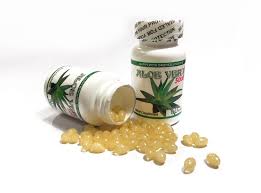Aloe Vera- the beneficial uses of this plant
Aloe Vera plant’s gel has a ton of health and wellness benefits
The
cosmetic, pharmaceutical, and food industries use Aloe Vera extensively, and the
plant has an estimated annual market value of $ 13 billion globally. Aloe
Vera is known for its thick, pointed, and fleshy green leaves, which may grow
to about 12–19 inches (30–50 centimeters) in length.
Each leaf
contains a slimy tissue that stores water, and this makes the leaves thick.
This water filled tissue is the “gel” that people associate with aloe Vera
products. The gel contains most of the beneficial bioactive compounds in the
plant, including vitamins, minerals, amino acids, and antioxidants.
Antioxidants
are important for health. Aloe Vera gel contains powerful
antioxidants belonging to a large family of substances known as polyphones. These
polyphones, along with several other compounds in aloe Vera, help inhibit the
growth of certain bacteria that can cause infections in humans.
Aloe Vera
is well known for its antibacterial, antiviral, and antiseptic
properties. This is part of why it may help heal wounds and treat skin
problems. People most often use Aloe Vera as a topical medication, rubbing it
onto the skin rather than consuming it. In fact, it has a long history of use
in treating sores, and particularly burns, including sunburn.
For example,
a review of experimental studies found that aloe vera could reduce the
healing time of burns by around 9 days compared with conventional medication.
It also helped prevent redness, itching, and infections.
Popular
since ancient Egypt, the plant is native to North Africa, Southern Europe, and
the Canary Islands and today is grown in tropical climates worldwide. And
what’s more, researchers are only just beginning to learn of the myriad uses of
it.
Here are some
important benefits of Aloe Vera.
Relief from
heartburn
A
2010 review suggested that consuming 1 to 3 ounces of aloe gel at
mealtime could reduce the severity of Gastro esophageal reflux
disease (GERD), a digestive disorder that can lead to heartburn. It has
also been shown to relieve other digestive issues. The plant’s low toxicity
makes it a safe and gentle remedy for heartburn.
Great as
mouthwash
A 2014 study
for the Ethiopian Journal of Health Sciences found aloe Vera extract to be
a safe and effective alternative to chemical-based mouthwashes. The plant’s natural
ingredients include a healthy dose of vitamin C, which helps to block plaque.
It is also a great relief if you
have bleeding or swollen gums.
Can lower
blood sugar
A study in
Phytomedicine: International Journal of Phytotherapy and Phytopharmacy says
that taking two tablespoons of Aloe Vera juice per day can help to lower blood
sugar levels in people with type 2 diabetes. Caution: The juice along with
diabetes medications could possibly lower your glucose count to dangerous
levels, so make sure to consult a doctor first.
Keep produce
fresh
Aloe gel may
be helpful in keeping fruits and vegetables fresh, thereby eliminating the need
for dangerous chemicals to extend the shelf life of produce.
A study published online in 2014 by the Cambridge University Press
focused on tomato plants coated with aloe gel. The report showed evidence that
the coating successfully blocked the growth of many types of harmful
bacteria on the vegetables.
Potentially
fight breast cancer
Research published
in Evidence-Based Complementary and Alternative Medicine looked at the
therapeutic properties of a special compound in aloe leaves. The authors
suggested that it shows the potential of slowing the growth of breast
cancer. However, more studies are needed for a conclusive statement on this.
Rukhsana Manzoor Deputy Editor















Post a Comment